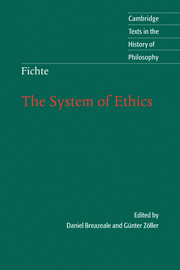Book contents
- Frontmatter
- Contents
- Acknowledgments
- Introduction
- Chronology
- Further reading
- Note on the text and translation
- List of abbreviations
- The System of Ethics
- Table of contents
- Introduction
- Part I Deduction of the principle of morality
- Part II Deduction of the reality and applicability of the principle of morality
- Part III Systematic application of the principle of morality, or ethics in the narrower sense
- Glossary
- Index
- Cambridge texts in the history of philosophy
Part II - Deduction of the reality and applicability of the principle of morality
Published online by Cambridge University Press: 05 June 2012
- Frontmatter
- Contents
- Acknowledgments
- Introduction
- Chronology
- Further reading
- Note on the text and translation
- List of abbreviations
- The System of Ethics
- Table of contents
- Introduction
- Part I Deduction of the principle of morality
- Part II Deduction of the reality and applicability of the principle of morality
- Part III Systematic application of the principle of morality, or ethics in the narrower sense
- Glossary
- Index
- Cambridge texts in the history of philosophy
Summary
Preliminary remark concerning this deduction
(1) What is meant by the “reality” or the “applicability” of a principle or (which means the same thing in this context) of a concept? more specifically, what kind of reality can pertain to the concept of morality?
To say that a concept possesses reality and applicability means that our world – that is to say, the world for us, the world of our consciousness – is in some respect determined by this concept. The concept in question is one of those concepts through which we think objects; and, because we think objects by means of this concept or in this manner, the object possesses certain distinctive features [Merkmale] for us. To seek the reality of a concept thus means to investigate how and in what way it determines an object. – I will clarify this by means of several examples.
The concept of causality possesses reality, because it is through this concept that a determinate connection arises among the manifold objects of my world. In consequence of this concept, thinking proceeds from one thing to another, and one can infer from an effect, as such, to a cause [iv, 64] or from a known cause to an effect. The act of thinking of the one is already included in a certain respect in the thought of the other. The concept of right possesses reality.
- Type
- Chapter
- Information
- Fichte: The System of Ethics , pp. 65 - 148Publisher: Cambridge University PressPrint publication year: 2005



